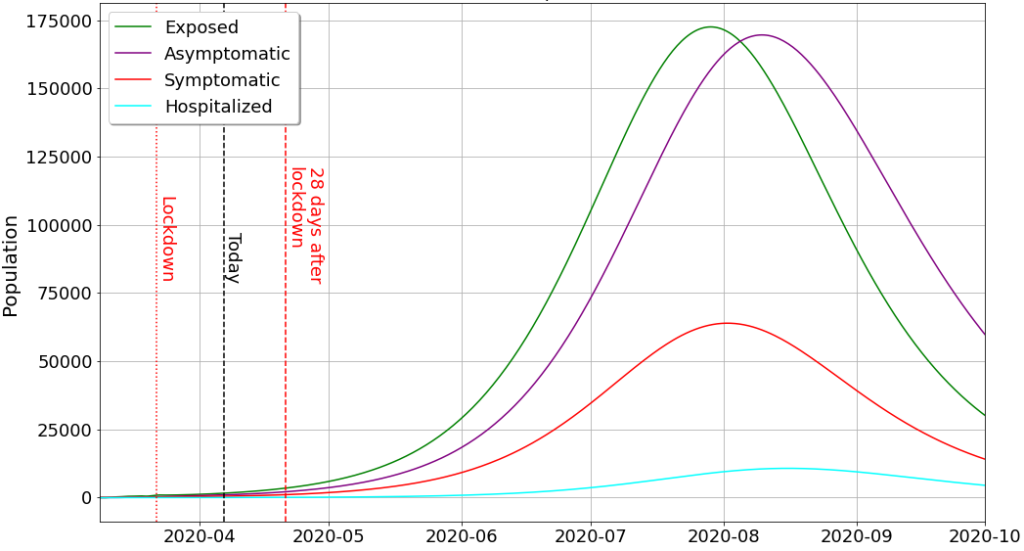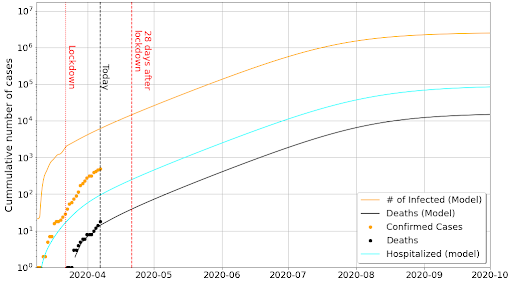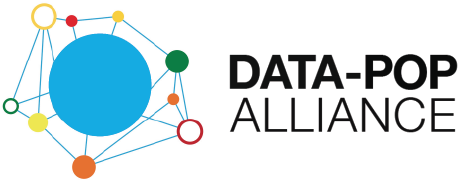TUNISIA
Information last updated: 5 May, 2020
- Total population: 11.7 M
- Population +65 yo: 8%
- GDP Per Capita: 11,009 USD
- Informal employment: 32% (2015)
- First registered case: 2 March
- Hospital beds: NA
Sources: TheWorld Bank and WHO (Population over 65 years old, Informal employment, GDP-PPP, Hospital beds).
Status
- General nationwide lockdown from March 22 to April 20.
- Risk for community spread is “highly elevated”.
Response set up and capacity
The National Coronavirus Response Authority was formed on March 25th to centralize prevention and control measures. Together with the Permanent National Committee for Disaster Prevention, Response and Relief (operating under the Ministry of Interior), it coordinates monitoring and follow-up efforts of the governorates and the Regional Committees of Disaster Prevention, Response and Rescue Organization. The Ministry of Health and the National Observatory of the New and Emerging Diseases (ONMNE) are also directly involved in the decision-making and coordination around the healthcare system and the lockdown measures. At the local level, municipalities have the right to implement, monitor and enforce additional measures.
Tunisia has adopted stringent measures early on to avoid an overburdened healthcare system. In spite of being ranked as the second best in Africa, the health care system of Tunisia is marked by underinvestment, lack of coordination, low number of ICU bed capacity and high regional disparities between the North, Center and South regions of the country and various governorates. With regards to the healthcare capacity, Tunisian public healthcare sector counts 109 district hospitals; 33 regional hospitals and 24 modern teaching hospitals (Centre Hospitalo-Universitaire). A recent study conducted by a doctoral candidate in Tunisia, surveyed that there are 282 functional ICU beds in the public sector (ratio of on average 3 beds/100 000 people). It has been announced that 400 additional beds would be made available from the private sector. In terms of testing as of 13/04, 12415 RT-PCR tests have been performed since the beginning of the crisis. Additional capacity for 30,000 additional tests (as of March 28) and 500,000 rapid tests is expected to arrive.
Stakeholder Mapping
Entities / Organizations
• National Coronavirus Response Authority (under the supervision of the Head of the Government)
• Permanent National Committee for Disaster Prevention, Response and Relief Organization
• National Security Council
• Ministry of Health
• National Observatory of New and Emerging Diseases (ONMNE)
• The National Authority for Health Assessment and Accreditation (INEAS)
• Ministry of Social Affairs
• Emergency Medical Service (SAMU)
• Governorates and Municipalities
Additional actors
• International organizations (IMF/ World Bank, IOM, UNHCR, GIZ, UNDP)
• Civil Society (IWatch)
• Citizen Initiatives/Tech Community (Dashboard of citizen initiatives and tech projects, Online citizen platform: mw.tn)
Mitigating factors - What is being done?
- March 2: The Tunisian Minister of Health confirms the first case of coronavirus. It was identified in a recent traveler from Italy who had self-reported having COVID symptoms.
- March 4: The Health Minister announces the suspension of ferry services coming from the Genoa port in the North of Italy. Safety and control measures for the cruise ships coming from Marseille, France are intensified. At the Carthage International Airport, terminal 2 becomes dedicated for passengers coming from Italy and border health checks are implemented.
- March 9: All maritime connections and flights with Italy are suspended except for Tunis-Rome flight route whose frequency was reduced from 14 weekly flights to 3. Significant reduction of flights with specific countries where coronavirus had started to actively spread: France, Germany, UK and Egypt. Additionally, school holidays are scheduled to start earlier. The MoH and ONMNE announce additional preventive measures which include, among others, the creation of the National Committee to monitor the epidemiological situation and coordinate the response; creation of a free hotline number for the public dedicated to COVID-19 related inquiries; and preparation of a “health guide” to treat the suspect cases and preparation of the necessary laboratory tests.
- March 13: All flights to Italy are cancelled. All passengers arriving in the country are obliged to self-isolate for 14 days. The government orders suspension of all collective prayers and early closure of restaurants and cafes from 4pm.
- March 16: PM Elyes Fakhfakh announces suspension of all international flights and closure of land, air and sea borders except for transport of goods and repatriation flights. Additionally, a ban on all public gatherings is placed and the daily working hours for state employees are reduced to 5 hours a day. The head of the government also announced a postponement of all sports events. Ban on inter-regional travel.
- March 18: A Presidential Decree is issued for a nationwide 12-hour curfew from 6pm to 6am with the army patrolling the streets to enforce it.
- March 20: A general nationwide lockdown is announced on March 20 by the President of the Republic Kaîs Saîed. The services and industries defined as essential, such as food industry, medical, administration and others, are allowed to continue operating.
- March 26: Laboratory testing was decentralized and extended from Charles Nicolle hospital to additional hospitals in Tunis, Monastir, Sousse and Sfax.
- March 31: The nationwide lockdown is extended by two weeks until April 20. Fines of TND 50 for breaking the confinement and curfew are put in place.
- April 2: The government opens a new shelter for women victims of violence. This facility is put in place to host women in the midst of an upsurge in gender based violence, acknowledging that access to existing shelters may put in risk women already there.
- April 4: The parliament activates Article 70 of the constitution by a majority vote, delegating some of its powers to the prime minister.
- April 19: lockdown is extended until May 3rd and the curfew hours changed to 8pm to 6am
- April 29: Government announces ‘deconfinment’ measures by phases, which will begin on May 4. This measurse will apply first to vital sectors of the economy, including professions for which telework cannot be done.
- May 4: First of three phases of ‘deconfinement’ strategy begins. This initial phase will go until May 14 .
In addition to the measures taken to prevent and limit the community spread of the coronavirus in the country, the government announced a set of financial aid measures to combat the negative social and economic effects of the crisis. However, since this announcement, and starting on March 30, different protests have taken place in different parts of the country “demanding an end to the lockdown and access to the financial aid the prime minister had pledged“. A number of similar protests against the lockdown also erupted in late March. In recent media coverage, President Kaid Sais has been seen personally distributing aid.
- The government announced a TND 2.5 Billion ($850 million USD, 2% of GDP) socio-economic package to vulnerable socio-economic groups and SMEs. Out of this, TND 450 million ($155million) is planned to be distributed in aid to poor families or those who have lost their jobs due to coronavirus outbreak.
- 1.2 billion in loans were announced in aid to help companies affected by the crisis.
- The Central Bank cut its key interest rate by 100 basis points.
- Additionally, the government adopted a delay on tax debts, postponement on taxes on small and medium-sized businesses and effected a delay on repayments for low-income employee loans.
- Financial aid has also been approved or pledged from the external multilateral sources: IMF approved $745m emergency assistance loan, EU granted €250m ($273m), Italy announced it would grant €50m ($55m), Islamic Development Bank announced plans to lend $280m.
Risks, vulnerabilities, obstacles
- As of April 14, according to the ONMNE the estimated risk of community spread remains very elevated and largely depends on the strict application and respect of the preventive measures, and specifically: targeted testing, self-isolation and confinement.
- Projected growth: As there are no official growth estimates by the government, individual public health experts have divergent opinions of the projected growth and the peak of the epidemic in Tunisia. While some public health representatives have expressed their opinion that the peak will come at the end of April, others have estimated the epidemic to reach its peak in August. In the scenario of a delayed peak, the ICU bed capacity is expected to be saturated by June.
Potential actions and demands
- Several accounts relayed by the media tell the story of people trying to get tested due to their symptoms, but being confronted by the unpreparedness of healthcare institutions in dealing with suspected cases. Public health experts have made the creation of a clear protocol and guidelines imperative in order to improve public health delivery.
- Many stakeholders, such as the national professional order of medical doctors, have publicly advocated for a mass non-targeted rapid testing strategy that expands testing to all public and private healthcare facilities. The additional 500,000 tests that were planned to be imported have not arrived yet, and the MoH has not changed its testing strategy at the moment.
- Given the socio-economic impact of the lockdown, some experts and civil society have called for a controlled de-confinement with large-scale testing, mandatory mask-wearing and obligatory quarantine if tested positive. On April 13, the scientific committee for fight against COVID-19 has recommended to extend the lockdown until May 3. The decision needs to be validated by the National Security Council.
- Experts have called to improve and expand the hospital capacity in terms of available ICU beds, personal protective equipment and ventilators. The Minister of Health, Abdellatif Mekki has announced that 4 additional temporary hospitals would be set up to receive COVID-19 patients.
- Quick coordinated actions are needed to distribute the emergency financial aid to the most vulnerable population and avoid the country-wide social crisis.
Key resources
- Covid-19.tn
- Al-Jazeera – Tunisia
- Observatoire National des Maladies Nouvelles et Emergentes
- Medium page of Jaber Belkhiria
- Mw.tn
- TAP news
- Coronavirus Threatens Freedom in North Africa
Contributor(s): Nigora Isamiddinova, Maria A. Bravo.




